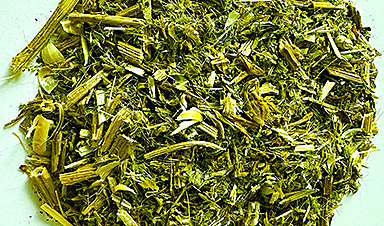Blessed thistle (Cnicus benedictus), a member of the Asteraceae family, thrives in our climate. This plant has been utilized for centuries as a medicinal herb, often consumed as an extract or tea to support the digestive system. Recently, researchers at the Center for Pharmacology of University Hospital Cologne and the Faculty of Medicine of the University of Cologne, led by Dr. Philipp Gobrecht and Professor Dr. Dietmar Fischer, have discovered a completely new application for its active component, Cnicin.
Animal models as well as human cells have shown that Cnicin significantly accelerates axon (nerve fibers) growth. The study was published in the journal Phytomedicine.
Rapid help for nerves
Regeneration pathways of injured nerves in humans and animals with long axons are accordingly long. This often makes the healing process lengthy and even frequently irreversible because the axons cannot reach their destination on time.
An accelerated regeneration growth rate can, therefore, make a big difference here, ensuring that the fibers reach their original destination on time before irreparable functional deficits can occur. The researchers demonstrated axon regeneration in animal models and human cells taken from retinae donated by patients. Administering a daily dose of Cnicin to mice or rats helped improve paralysis and neuropathy much more quickly.
Compared to other compounds, Cnicin has one crucial advantage: it can be introduced into the bloodstream orally (by mouth). It does not have to be given by injection. “The correct dose is very important here, as Cnicin only works within a specific therapeutic window. Doses that are too low or too high are ineffective. This is why further clinical studies on humans are crucial,” said Fischer. The University of Cologne researchers are currently planning relevant studies. The Center for Pharmacology is researching and developing drugs to repair the damaged nervous system.
Reference: “Cnicin promotes functional nerve regeneration” by Philipp Gobrecht, Jeannette Gebel, Marco Leibinger, Charlotte Zeitler, Zhendong Chen, Dirk Gründemann and Dietmar Fischer, 14 April 2024, Phytomedicine.
DOI: 10.1016/j.phymed.2024.155641
The current study received funding of around 1,200,000 euros from the Federal Ministry of Education and Research within the framework of the project PARREGERON.
News
Catching COVID significantly raises the risk of developing kidney disease, researchers find
Catching Covid significantly raises the risk of developing deadly kidney disease, research has shown. The virus was found to increase the chances that patients will develop the incurable condition by around 50 per cent. [...]
New Toothpaste Stops Gum Disease Without Harming Healthy Bacteria
Researchers have developed a targeted approach to combat periodontitis without disrupting the natural balance of the oral microbiome. The innovation could reshape how gum disease is treated while preserving beneficial bacteria. The human mouth [...]
Plastic Without End: Are We Polluting the Planet for Eternity?
The Kunming Montreal Global Biodiversity Framework calls for the elimination of plastic pollution by 2030. If that goal has been clearly set, why have meaningful measures that create real change still not been implemented? [...]
Scientists Rewire Natural Killer Cells To Attack Cancer Faster and Harder
Researchers tested new CAR designs in NK-92 cells and found the modified cells killed tumor cells more effectively, showing stronger anti-cancer activity. Researchers at the Ribeirão Preto Blood Center and the Center for Cell-Based [...]
New “Cellular” Target Could Transform How We Treat Alzheimer’s Disease
A new study from researchers highlights an unexpected player in Alzheimer’s disease: aging astrocytes. Senescent astrocytes have been identified as a major contributor to Alzheimer’s progression. The cells lose protective functions and fuel inflammation, particularly in [...]
Treating a Common Dental Infection… Effects That Extend Far Beyond the Mouth
Successful root canal treatment may help lower inflammation associated with heart disease and improve blood sugar and cholesterol levels. Treating an infected tooth with a successful root canal procedure may do more than relieve [...]
Microplastics found in prostate tumors in small study
In a new study, researchers found microplastics deep inside prostate cancer tumors, raising more questions about the role the ubiquitous pollutants play in public health. The findings — which come from a small study of 10 [...]
All blue-eyed people have this one thing in common
All Blue-Eyed People Have This One Thing In Common Blue Eyes Aren’t Random—Research Traces Them Back to One Prehistoric Human It sounds like a myth at first — something you’d hear in a folklore [...]
Scientists reveal how exercise protects the brain from Alzheimer’s
Researchers at UC San Francisco have identified a biological process that may explain why exercise sharpens thinking and memory. Their findings suggest that physical activity strengthens the brain's built in defense system, helping protect [...]
NanoMedical Brain/Cloud Interface – Explorations and Implications. A new book from Frank Boehm
New book from Frank Boehm, NanoappsMedical Inc Founder: This book explores the future hypothetical possibility that the cerebral cortex of the human brain might be seamlessly, safely, and securely connected with the Cloud via [...]
Deadly Pancreatic Cancer Found To “Wire Itself” Into the Body’s Nerves
A newly discovered link between pancreatic cancer and neural signaling reveals a promising drug target that slows tumor growth by blocking glutamate uptake. Pancreatic cancer is among the most deadly cancers, and scientists are [...]
This Simple Brain Exercise May Protect Against Dementia for 20 Years
A long-running study following thousands of older adults suggests that a relatively brief period of targeted brain training may have effects that last decades. Starting in the late 1990s, close to 3,000 older adults [...]
Scientists Crack a 50-Year Tissue Mystery With Major Cancer Implications
Researchers have resolved a 50-year-old scientific mystery by identifying the molecular mechanism that allows tissues to regenerate after severe damage. The discovery could help guide future treatments aimed at reducing the risk of cancer [...]
This New Blood Test Can Detect Cancer Before Tumors Appear
A new CRISPR-powered light sensor can detect the faintest whispers of cancer in a single drop of blood. Scientists have created an advanced light-based sensor capable of identifying extremely small amounts of cancer biomarkers [...]
Blindness Breakthrough? This Snail Regrows Eyes in 30 Days
A snail that regrows its eyes may hold the genetic clues to restoring human sight. Human eyes are intricate organs that cannot regrow once damaged. Surprisingly, they share key structural features with the eyes [...]
This Is Why the Same Virus Hits People So Differently
Scientists have mapped how genetics and life experiences leave lasting epigenetic marks on immune cells. The discovery helps explain why people respond so differently to the same infections and could lead to more personalized [...]





















